- Home
- Blaze Ward
The Mind Field Page 2
The Mind Field Read online
Page 2
Zakhar settled himself back in his chair. So far, nobody heaving their guts up into a handy trashcan. It happened occasionally, more inner ear and psychology than bio–medical.
“Navigation,” Zakhar called regally, “bring the engines on line and ahead slow.”
“Belay that order,” Javier snarled from his station.
Zakhar jumped as far out of his seat as his belt would allow.
“Nobody do nothin’,” Javier continued savagely.
“Aritza,” Sokolov barked, “explain yourself. This is my bridge.”
“Yes, is it,” Javier agreed without looking up from his console screen. One hand snaked out and touched a blue light flashing madly on his console. “And somebody out there just lit us up with a nice, solid weapon lock.”
“Have they challenged us?” Zakhar asked, much less angry.
“Not yet,” Javier replied. “Or rather, if they have, it wasn’t on any of the standard channels.”
“Where would it be?” asked the Gunner. Her hands were poised on her controls, but she was waiting patiently.
Javier looked over, fixed her dark eyes with one beady eye of his own. “Whatever you do, Mary–Elizabeth Suzuki, do not deploy turrets or open a launch bay,” he said, deadly serious.
Zakhar was surprised. He didn’t think Javier did deadly serious.
This must be really bad.
“All hands,” Zakhar said, reinforcing the point and letting the bridge computer transmit the message ship–wide, “stand down. We have a situation outside the ship we are investigating.”
He closed the channel and looked as his Science Officer. It already felt like one of those days were he was going to owe the man big again. How would they keep him aboard once he paid off his debts and was free?
“Javier,” he asked, “what’s your theory?”
Javier looked both ways, as if double–checking that nobody was about to do anything. He started to say something when a sudden chime on his console got his attention.
Zakhar felt the emotional lurch as Javier turned back to his screens instead of speaking. The whole bridge seemed to sag, waiting.
He watched Javier pull an earpiece and stick it in. The man listened for a few moments, shook his head, and muttered something under his breath so profane even Sokolov blinked.
“I found their transmission,” Javier announced. “It’s in Bulgarian, down on one of the lower, older channels hardly anybody uses anymore. That’s the good news.”
“What’s the bad news?” Zakhar asked conversationally.
“It’s an automated sentry challenge,” he replied.
Zakhar used the same word Javier just had.
Mary–Elizabeth cocked her head at the two men. “Could you two explain that for the mere mortals around here?” she asked with a sarcastic edge that sounded remarkably like what Javier would have used. Obviously, the man was rubbing off on her. The professionalism would be good, but not the attitude problem.
Javier turned to Zakhar and raised an eyebrow.
“You found it, Javier,” the Captain said. “You explain it. Do we know if it works?”
“No,” Javier blew out a breath. “The only way to know that is when it fires, or fails to. I could live the rest of my days without knowing, thank you.”
“Talk, mister,” Mary–Elizabeth barked. “I’m getting tired of you yammering. Gimme data.”
“Yeah, yeah. Fine.”
Javier pushed a button on his console and the main screen suddenly showed a schematic of the local area. Storm Gauntlet’s purple star sat in the middle, surrounded by other stars of various colors.
“We just jumped into a live minefield,” he announced sourly. “I am beginning to map things based on their own signals, while not generating any of our own. Fortunately, we came in dark. The minefield is intelligent, but not fully sentient. It isn’t sure if we’re a newly arrived asteroid that just wandered into range, or an enemy starship it should kill. On channel 392, it is asking us for the correct authentication code to safely transit the kill zone.”
Zakhar watched him pick up his mug and empty it in one go. It was going to be that kind of day.
“Why would sentience be bad, Javier?” Mary–Elizabeth asked.
“Because it would probably just shoot us anyway, Suzuki,” Zakhar answered before Javier could.
“Oh,” she said quietly. “Can it kill us?”
“Shields were down for the jump,” Javier said. “Powering them up most assuredly triggers something, somewhere. There were dreadnaughts at the battle of A’Nacia, so there are probably guns big enough here to gig us like a frog.”
“Gig?” someone asked from over near the engineering seats.
“The term our Science Officer is looking for is splatter,” Zakhar replied. “That’s a much more accurate, technical term. Boom.”
“Recommendation, Captain?” Javier asked politely.
This day was turning into an absolute surprise as other sides of Aritza’s behavior came out for the first time.
“Go ahead,” Zakhar replied. Internally, he noted how much the two of them sounded like old Concord Fleet Officers, which they were. The piracy veneer apparently wasn’t that deep, after all.
“Can we start shutting down systems? Turn the air temp down so we have longer before we have to dump heat? Power off things that might accidentally generate a signal outside the ship? That sort of thing?”
Zakhar considered it. All things that made sense, since nobody knew what might trigger a lethal surprise. They might not know until it killed them, and then only for a few seconds.
“Agreed,” he said. He keyed the general comm live. “Engineering, Bridge. We’re going to start powering down some systems to run quieter. Please coordinate with the Science Officer. And tell people to dress warm.”
“Yes, Captain,” came the polite, diffident voice of Andreea Dalca, the Engineer.
Zakhar looked around the bridge. Command decision time. “Everybody shut down your stations and drop down to emergency crew only. The rest of you are still on duty, so go do paperwork or something.”
Zakhar counted ten seconds until the only people on the bridge were himself, Aritza, and Sykora, the Dragoon. He didn’t say anything to her. She was going to stay and keep a watch on everything the Science Officer did. At least she had stopped wearing a sidearm on the bridge. Most of the time.
The room went dim as Aritza brought the lights lower. Conserving power now meant conserving heat. He was going to need to grab a jacket out of his day cabin in a bit, but he had enough layers for now.
“Okay, hotshot,” Zakhar said to the back of Aritza’s head, “how do we get out of this one?”
“I promise you, Captain,” Javier turned to look at him, “you will be the second one to know.”
Part Four
Djamila was used to complex multi–tasking. It was practically a requirement to be successful at what she did.
She could, for example, track two different moving targets and fire accurately at both, pistols in both hands and one eyeball following each. She was capable of zero–gravity maneuvers that had earned her the nickname Ballerina of Death from her teammates, back in her days with the Neu Berne Navy.
Right now, she was flexing individual muscles in her legs to keep them warm and loose, while she sat quietly at a dark console on the bridge and knitted. It gave the hands something to do while the legs worked. The mind was watching Javier Aritza, their much–vaunted Science Officer with his custom coffee cup, pace around a three dimensional projection of the local environment.
When asked, he had explained that pacing made him look at things from different angles in a way that just spinning the projection around didn’t do. She could respect that. It was one of the few times the man was a proper professional. Now, if only he could be like that more often, she might actually like him. Hell might freeze over first, but that wasn’t her problem.
She looked down as her hands auto–piloted their way to the r
ow marker. The project was well on its way to being a sweater at some point. Much sooner than she had expected if they were going to spend many more hours drifting and tumbling slowly. Pretty soon she would have to break it off as she got to the bottom of the sleeve holes. But not for a while.
As she started on the next row around, she looked more closely at the projection. Djamila wasn’t nearly as capable with the sensors as Aritza, but she understood enough to ask competent questions. And he had apparently appreciated trying to explain things to her, because he would get into the middle of a sentence and suddenly break off to go type furiously for several seconds before talking again.
The projection was starting to take shape. Different color stars appeared, strengthened, sharpened.
Apparently, minefields in space were like defensive fortifications on the ground. And she was an expert at those. Defense in depth. Overlapping fields of fire. Enfilade. Variety in range engagements. Lateral support. Stealth. Guile. Ambush.
It took patience to unravel, unlike the soon–to–be sweater in her hands. Watching Javier work reminded her of advanced tactical exercises she had run. Understand the terrain. Understand your enemy’s plans for you and his tendencies. Find the weak spot he designed into the system as a honey trap to draw you in and kill you. Unravel the design until you found the hole he missed.
It had been four hours. She had watched Aritza like a hawk. Not because she expected him to actually commit suicide, he was too vibrant to just die so easily, but because she wanted to see him actually sweat. The man was far too lackadaisical.
Plus, he wanted to make sure they all went to jail, or the hangman.
Everyone else had forgotten that, but she occasionally still saw that look in his eyes. Usually when he was looking at her. That desire. That hunger. That hatred. It made her warm and tingly.
Besides, she smiled to herself as she worked, having a good enemy made you better. It made you keep upping your game, in a complex arms race to see who could win, especially two well–matched opponents.
So she studied him. Learned his traits and his tendencies. Watched him work so she knew his weaknesses, even as he worked the understand the long–dead designer of the trap they had entered.
You never knew when information like that would be useful.
From Javier’s explanation, the minefield was a hive mind. There was no single controller they could kill to escape. Instead, a small part of the overall intelligence was in each little metal body floating around. It thought slowly, as a result. Patiently. Like a trapdoor spider. Waiting.
She understood that sort of patience.
Around them, dozens of killers floated. Big guns. Little guns. Armoured pods. Things to kill dreadnaughts. Things to kill shuttles. Every one of them powered by the solar wind and designed to last forever. It had been five and a half centuries, so far.
She had looked up the battle. Pyrrhic failed to cover the consequences.
Five fleets had all been functionally destroyed. But that was enough for New London to win the war and proclaim the Union of Mankind to a war–weary galaxy. The last significant challenger to their dream of a universal government had died on the planet below when someone had lost control of a terminally–damaged dreadnaught and it had plunged into the atmosphere, exploding only a few tens of thousands of meters above the ground, over the capital city of an entire Pocket Empire.
According to Aritza, the crater was apparently still visible from orbit, a bullet wound just rising into view below them in the near distance, beyond the minefield, inside the shell of death and destruction the war had left.
Afterward, there had been nobody to turn off the mines. Or the minefield had been laid by the victors as a way of salting the earth. Nobody knew the truth. It only mattered now because they were trapped in it, a small fly stuck in fresh sap, waiting for it to harden into amber. Or trapped in a web, waiting for the spider.
Part Five
Javier had finally found someone to dislike more than the amazon, Sykora. It had been a difficult thing. After all, the minefield designer had never given him a concussion, or worked him into utter exhaustion fixing bio–scrubbers, or any of the other things Sykora had done since they had first met, the first time she had shot him.
But the person who designed the defenses around A’Nacia? Here was a prime candidate for his considerable hatred.
Five hundred and fifty years had passed, more or less. The system this designer had built was still intact enough to threaten them. Javier had no doubt that the weapons were fully charged and just waiting to fire. He had sat here and watched the little battle–bots push themselves around with little pulses of energy, so he knew that most of them were working.
At least four different satellites were locked onto Storm Gauntlet with cannons of some sort at this moment. Certainly the weapons pointed this direction were things the hivemind that was controlling the field thought were hot enough to crush this ship if she turned out to be an enemy ship and not a rock floating around.
Javier wasn’t sure the system wouldn’t fire on rocks either. Eventually.
He would have programmed in that behavior.
He had, however, begun to solve the design of the system, sitting here and passively listening. Each satellite in the net broadcast an ID and a location on a regular basis, about every second or so, so the rest knew where each other was and what it was doing.
He had a catalog going. The forty–six closest ones, mapped and classified roughly into ship–killers, shuttle–killers, and scanners that just sat and watched. Some he had no clue what they did.
Their cryptography was weak, but still too strong for him to crack in anything less than a month, even with the navigation computer brute–forcing the signal.
And there were just too many of them out there for Mary–Elizabeth to take out in one salvo. He didn’t trust that the shields would come up fast enough to help, or be strong enough to hold out. Someone had planned for dreadnaughts. That meant big guns.
Javier considered the ship’s stealth cloak, but that just made it hard to scan them, not invisible. In fact, it had probably been what kept them alive, since they didn’t scan like a starship to the stupid brain running things over there.
As soon as they did anything to change that conclusion, they would get boomed. And he was far too beautiful to die like this.
That’s what he kept telling himself.
He looked down at his favorite tea mug and decided it had been empty long enough. And he was hungry. And she had been staring holes in the back of his head long enough.
Javier pushed a button to save all his notes and stood up.
“You’re in charge,” he said as he walked to the door.
“Where are you going?” she said, startled.
It felt good to throw her off balance every once in a while. She was just too damned smug, most of the time. Right now, she was furiously packing yarn and stabby things into a small cloth bag and trying to stand as he went past.
“Lunch,” he replied, biting off the other replies that were rude, or snarky, or just obnoxious. Not today. He was too tired.
“Wait,” she said, abruptly, “I’ll come with you.”
Javier actually stopped and looked back at her as the hatch slid open, holding his surprise in.
“You have the deck,” he said, cruelly, as he stepped backwards and let it close on her surprised face.
Ξ
Javier had gotten food from the buffet line and an industrially–manufactured tea–substitute by the time she tracked him down in the main wardroom. Today it was something vaguely approximating previously–frozen burritos and what could charitably be called red rice, heavy on the vitamins and nutrients, light on taste.
He looked up as she walked up, just short of stomping.
“You aren’t supposed to just walk off the bridge,” she said firmly, professionally, scoldingly.
“What?” he smiled innocently, “you mean I should turn over operational control
to another Centurion or qualified Yeoman?
She wasn’t standing close enough that he could actually hear her teeth grind, but the imaginary image in his head was close enough. He smiled up at her. Way up. Sitting, he was just about looking at her belt buckle.
She didn’t respond, but instead slid the chair across from him back and practically threw herself into it.
“What have you learned?” she began the interrogation.
Javier carefully chewed the first bite of his burrito forty–two times, just like his mother had told him to do when he was a kid.
She was gnashing her teeth by thirty–four.
Javier swallowed, set the wrap down, and took a careful drink of the tea, slow to savor the industrial goodness that came of chemicals instead of dried plant leaves that he grew down in his botany hideout.
“Well?” she continued.
“The burritos aren’t half bad,” he said slowly, “but the tea just doesn’t have it today. I would recommend the coffee.”
“I meant about the minefield,” she replied with a growl, exasperation filling her voice.
“It hasn’t killed us yet,” Javier said and stuffed another bite of meat–substitute–and–bean–thing into his mouth.
Chew. Chew. Chew.
“So you’re no closer to solving the puzzle than before?” she sneered.
“Oh, I know lots of ways to solve it,” he replied, eventually. “Most of them end up with us dead.”
“Most?”
There was a really strange look in her eyes. One that might have been mistaken for hope, but that assumed that little miss invulnerable amazon giant had the least doubts in her ability to survive this particular situation. Especially when she had to count on Javier to save her.
Probably she just had gas.
“The rest are so completely insane that the Captain would never go for it.”
“How do you know until you ask him?” she asked with a smile. Upbeat rationality from her was a new thing. Probably a trick, like telling him to look over his shoulder right before she slugged him in the jaw. Again.

 Return
Return Queen Anne's Revenge
Queen Anne's Revenge Star Dragon Box Set One
Star Dragon Box Set One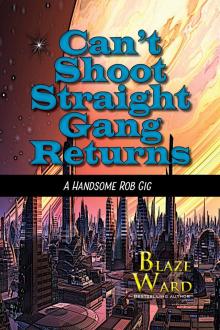 Can't Shoot Straight Gang Returns
Can't Shoot Straight Gang Returns Persephone
Persephone Petron
Petron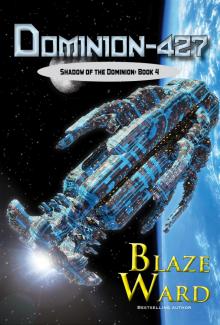 Dominion-427
Dominion-427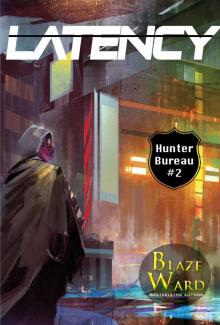 Latency
Latency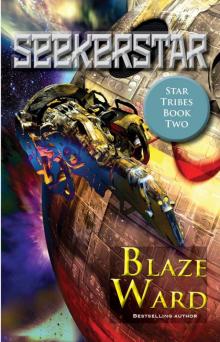 SeekerStar
SeekerStar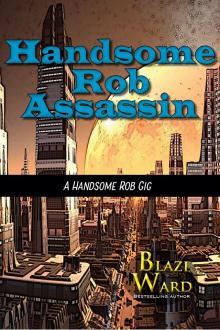 Handsome Rob Assassin
Handsome Rob Assassin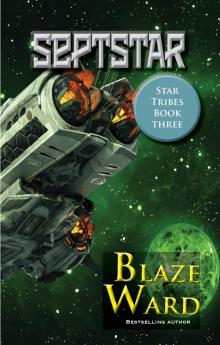 SeptStar
SeptStar WinterStar
WinterStar Way of the Sword
Way of the Sword Winterhome
Winterhome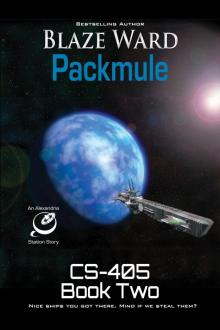 Packmule
Packmule Longshot Hypothesis
Longshot Hypothesis Outermost
Outermost Two Bottles of Wine with a War God
Two Bottles of Wine with a War God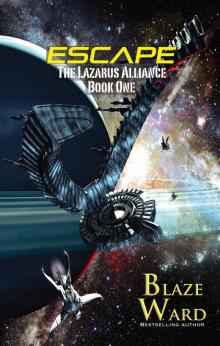 Escape
Escape The Mind Field
The Mind Field St. Legier
St. Legier Last of the Immortals (The Jessica Keller Chronicles Book 3)
Last of the Immortals (The Jessica Keller Chronicles Book 3) Auberon (The Jessica Keller Chronicles Book 1)
Auberon (The Jessica Keller Chronicles Book 1) Siren
Siren Flight of the Blackbird (The Jessica Keller Chronicles Book 5)
Flight of the Blackbird (The Jessica Keller Chronicles Book 5) Queen of the Pirates
Queen of the Pirates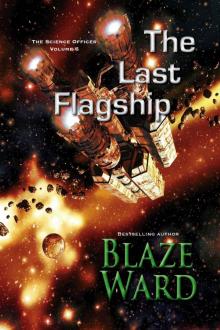 The Last Flagship (The Science Officer Book 6)
The Last Flagship (The Science Officer Book 6) The Science Officer
The Science Officer The Story Road
The Story Road Goddess of War (The Jessica Keller Chronicles Book 4)
Goddess of War (The Jessica Keller Chronicles Book 4) The Pleasure Dome (The Science Officer Book 4)
The Pleasure Dome (The Science Officer Book 4)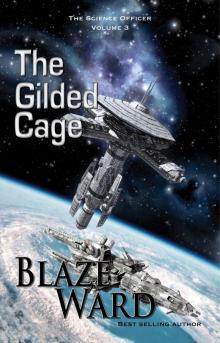 The Gilded Cage
The Gilded Cage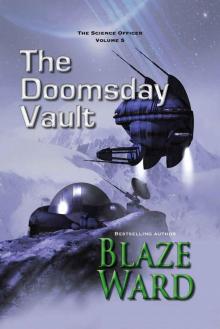 The Doomsday Vault (The Science Officer Book 5)
The Doomsday Vault (The Science Officer Book 5) Fairchild
Fairchild